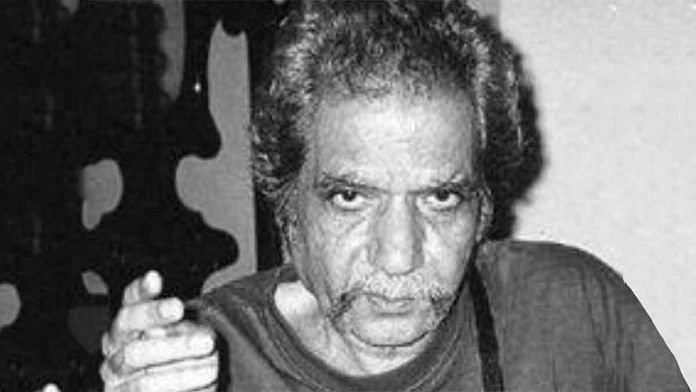New Delhi: “Shit city, he thunders;
the lion of Bombay thunders,
Shit city!
I shit on you.
You were a group
of seven shitty islands
given in dowry
to the Shit King of Ing
to shit on
– and now it’s all
one big high-rise shit;
waiting for God
to pull the flush”
– The Shit Sermon, Kala Ghoda poems by Arun Kolatkar
Audacious is the first word that comes to mind when reading an Arun Kolatkar poem. He wasn’t the most popular poet in Maharashtra, but much of his fame can be credited to the liberal use of expletives in his work.
Born in 1932, in Kolhapur, Maharashtra, Kolatkar grew up in a home that he described as “a house of cards — the rooms had mud floors which had to be plastered with cow dung every week to keep them in good repair”. He enrolled in the JJ School of Arts in 1949 and finished his diploma in 1957.
A graphic designer by profession, he earned his reputation in the advertising world and it wasn’t until the 1960s that he began to write. Kolatkar, with his ‘two-headed pencil’, was one of the pioneers of modern poetry in India. His work is reflective of other contemporary poets such as Vilas Sarang, Dilip Chitre and Vinda Karandikar. A critique of a post-colonial India, combined with a dark humour, was an unmatched skill he possessed.
On his 15th death anniversary, ThePrint revisits Kolatkar’s starkly riveting poetic landscape.
Also read: Mir Taqi Mir — a master of Urdu who was in love with Delhi
A private poet
Kolatkar’s work stems purely from observation as he sat for 15 years, every Thursday afternoon at Wayside Inn Cafe in the Kala Ghoda area of Mumbai. A prolific writer in both Marathi and English, he was a recluse and while he wrote many poems, most of them saw the light of day only towards the end of his life. For the longest time, Jejuri was his only publicly available collection.
Jejuri was described by academic Anjali Nerlekar as an “amazing series of poems on the temple town in Maharashtra where the poet rips apart the hypocrisy and cant of the powerful Brahmins with their vice-like hold on the religion and underscores the anachronism of this religion in the modern world”.
It earned him the Commonwealth Poetry Prize in 1976.
He was diagnosed with cancer in the late 1990s, following which he released four more books in the final two years of his life. In 2003, he released Bhijki Vahi and Chirimiri in Marathi — the former won him the Sahitya Akademi Award in 2004. The following year he released Dron, also in Marathi, along with Sarpa Satra and Kala Ghoda Poems in English.
Kala Ghoda Poems – Kolatkar on post colonial India
With the release of Kala Ghoda Poems, Kolatkar moved to the larger issue of how an ‘independent’ India continues to be a place where those who are unable to fit into the idea of a “modern, consumerist, progressive nation” are actively ignored. The anthology is a commentary on the urban life in the city, where he essentially attempts to bring the marginalised into the limelight.
He created the cover for the collection as well. A statement in itself, it is predominantly monochrome with carefully placed yellow flowers that “reinterpret the ordinary, even dreary scene, investing it with a dash of glamour one does not associate with the rest of the scene, much like the subject of the poems in this book”.
The choice of the title is telling of its genre. Named after one of the most popular areas in South Bombay, Kala Ghoda literally translates to the black horse. The area got its name from the statue of King Edward VII (the then Prince of Wales) which was made from black stone.
Gifted by Sir Alfred Sassoon, the monument commemorated the arrival of King Edward VII in India. Symbolising imperial power, its presence in colonial times made sense. However, by 1960 an independent India felt mocked by it in the country’s soon-to-be financial capital. It was, therefore, moved to the Byculla zoo. But a similar statue was placed in Kala Ghoda in 2017.
The Barefoot Queen of the Crossroads, which features in this collection, stands out.
She has dominion
over two traffic islands
and three pavements.
– The Barefoot Queen of the Crossroads, Kala Ghoda Poems by Arun Kolatkar
Kolatkar describes a woman who lives on the streets of Mumbai. Calling her “dark as bitter chocolate”, he narrates his observations as she dries her hair, dressed in a petticoat.
She has washed her hair, this morning
and she’s standing with her back to the sun, to dry it
and the huge damp patch, on her
clean white but slightly rumpled petticoat,
which is what she’s wearing at the moment, apart from a
yellow choli above
and silver anklets below
playing hide and seek in the scalloped shadow of her
petticoat, She has yet to wear her sari.
–The Barefoot Queen of the Crossroads, Kala Ghoda Poems by Arun Kolatkar
The entire poem is an act of voyeurism, Kolatkar brings our attention to something as personal as drying hair, which takes place in as public a place as the streets. The details are so minute, the reader forgets the bigger picture and the shameless invasion of privacy that is being performed.
He is considered a successor to the great 17th century Marathi poet Tukaram, but his poetry is very much a product of his times. Kolatkar’s work reflects the soul of the city and will continue to do it as well as it does till another reclusive, irreverent, audacious poet decides to write.
Also read: Music, folklore & passion — how BV Karanth transformed Indian theatre



